 Petzlover
Petzlover Gull Terr is originated from Pakistan but Welsh Sheepdog is originated from United Kingdom. Gull Terr may grow 10 cm / 4 inches higher than Welsh Sheepdog. Gull Terr may weigh 20 kg / 45 pounds more than Welsh Sheepdog. Gull Terr may live 3 years less than Welsh Sheepdog. Both Gull Terr and Welsh Sheepdog has almost same litter size. Both Gull Terr and Welsh Sheepdog requires Low Maintenance.
Gull Terr is originated from Pakistan but Welsh Sheepdog is originated from United Kingdom. Gull Terr may grow 10 cm / 4 inches higher than Welsh Sheepdog. Gull Terr may weigh 20 kg / 45 pounds more than Welsh Sheepdog. Gull Terr may live 3 years less than Welsh Sheepdog. Both Gull Terr and Welsh Sheepdog has almost same litter size. Both Gull Terr and Welsh Sheepdog requires Low Maintenance.
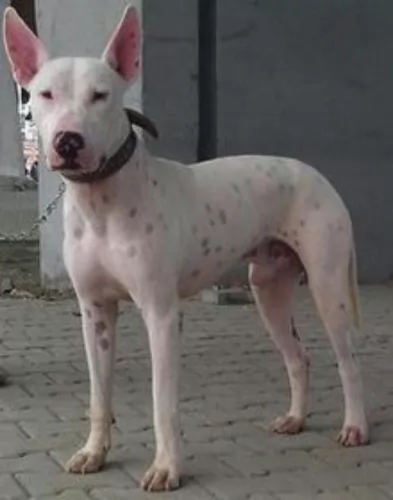 The Gull Terr hails from Pakistan. Having been introduced to the country by the British Raj, the dog has always been valued for its guarding and fighting abilities.
The Gull Terr hails from Pakistan. Having been introduced to the country by the British Raj, the dog has always been valued for its guarding and fighting abilities.
The British army, on bringing English Bull Terriers with them, mated them with local dogs. The dog was in other words, created from the old bull terrier which became extinct, and the Bully Kutta.
The Gull Terr or Pakistani Bull Terrier as he is known is a rare breed of dog. Today they are usually found in rural areas of Pakistan as well as in the Indian Panjab area, becoming popular as both pet and watchdog. It is no longer used for dog fighting as this has been banned.
 The Welsh Sheepdog is sometimes referred to as the Welsh Collie, but it is not a collie in anyway. It is the cross between the Border Collie and Welsh Sheepdog that is actually the Welsh Collie. The sheepdog was bred for herding not appearance and they are not all consistent in looks and size. They are a collie type but do not have recent collie ancestors. In fact the Border Collie has basically replaced the Welsh Sheepdog in herding sheep in Wales. The Welsh Sheepdog is still being bred as an indigenous breed. They are still prized for their ability to work independently and herding cattle, pigs, horses and goats as well as sheep. They were originally drovers.
The Welsh Sheepdog is sometimes referred to as the Welsh Collie, but it is not a collie in anyway. It is the cross between the Border Collie and Welsh Sheepdog that is actually the Welsh Collie. The sheepdog was bred for herding not appearance and they are not all consistent in looks and size. They are a collie type but do not have recent collie ancestors. In fact the Border Collie has basically replaced the Welsh Sheepdog in herding sheep in Wales. The Welsh Sheepdog is still being bred as an indigenous breed. They are still prized for their ability to work independently and herding cattle, pigs, horses and goats as well as sheep. They were originally drovers.
In the 18th century there were many different Welsh herding dogs and one drover might have 4-6 different types of sheepdogs as guard dogs, herders and hunters. Most of these breeds were taller than the Welsh Sheepdog. By 1940 there aere only a couple of breeds doing these jobs in Wales. The purebred Welsh Hillman and Black and Tan Sheepdog were on the verge of extinction at that point.
At that time the most common dogs were descendants of the Black and Tan Sheepdog and the Border Collie. The Welsh Sheepdog was still working in central Wales and in the north country. They were purely a working breed and not a show breed in any way. They remain that today.
They are a landrace and very rare today. They have been around for more than 800 years with no effort at standardization for this working dog. They are only registered with the WSS or Welsh Sheepdog Society and the DRA Dog Registry of America.
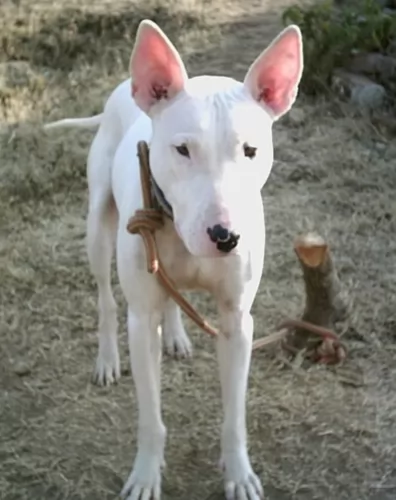 As a medium sized dog, the muscled Gull Terr stands as 45 – 66cm in height and weighs in the area of 40 – 45kg.
As a medium sized dog, the muscled Gull Terr stands as 45 – 66cm in height and weighs in the area of 40 – 45kg.
The dog has a short, smooth coat which is white, but you may find some black spots on him. He has a egg shaped head, ears are naturally erect, dark slanted eyes, and he has a long tail which is held upwards. Muscled and agile, he is a powerful working breed and makes a good watchdog.
This is an aggressive dog breed, and first-time dog owners might want to have a more amicable kind of pet to start off with.
He is a fearless dog, somewhat aggressive and suspicious towards strangers and therefore wants to protect his owner from them. With training and socialization he can be good with children in the home, although he is inclined to be boisterous and stubborn. He has fierce protective instincts, even though he is considered not as aggressive as some other Pakistani dog breeds.
The Gull Terr will need an experienced dog handler. Even though he has been a fighter in his day, he is capable of being an excellent family pet as well. You won't have trouble training him as he is intelligent. He then becomes more obedient and more manageable. He is a very active dog and therefore he won't fit into city dwelling where there are small spaces. He needs a place to run and on top of that he will require a good deal of exercise.
 Bred for their herding abilities not their appearance, the Welsh Sheepdog can vary in color, build and size. They have long legs, broad chests and wide muzzles. They are all around bigger than the Border Collie. They come in black and white, tricolor, red and white and merle. The coat can be short or long and the ears pricked and folded at the top.
Bred for their herding abilities not their appearance, the Welsh Sheepdog can vary in color, build and size. They have long legs, broad chests and wide muzzles. They are all around bigger than the Border Collie. They come in black and white, tricolor, red and white and merle. The coat can be short or long and the ears pricked and folded at the top.
They look most like the Border Collie with a taller, broader, more solid build. They typically are stronger than the Border. Their head is distinctly collie shaped, flat and broad with the wide muzzle. The nose is black and the eyes are oval and brown. The merles can have striking blue eyes.
This is an athletic dog and you can tell by looking at her. Well muscled, broad back and neck with a long upward tail. Their tough paws are perfect for the rough terrain and Wales mountainsides.
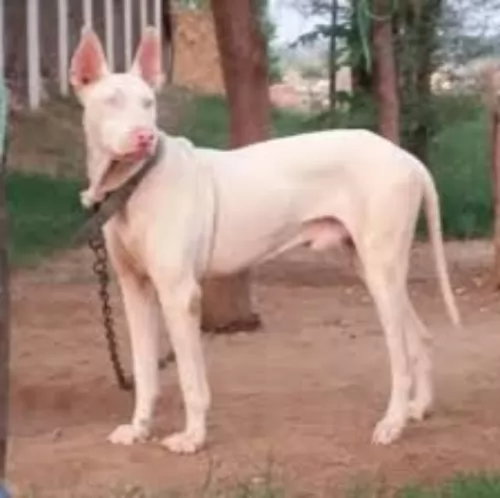 Your Gull Terr love the attention he receives from his human family and he won’t flourish at all if he is put into the back yard for watch dog purposes only. He is a dog that needs to come indoors to be with his family.
Your Gull Terr love the attention he receives from his human family and he won’t flourish at all if he is put into the back yard for watch dog purposes only. He is a dog that needs to come indoors to be with his family.
He tends to be somewhat aggressive and this is why he isn’t looked upon as the ideal pet for first-time dog owners and those with young children in the home.
He is a confrontational dog, willing to enter into a fight with provocation. Strong willed he will require early training and socialization, and when he is brought up by a firm, consistent, kind owner, he can get over his aggression and become a loyal, devoted, protective and loving pet.
 1Children friendliness not really – aloof and concerned with job- all this dog wants to do is work.
1Children friendliness not really – aloof and concerned with job- all this dog wants to do is work.
3.Adaptability – Not an inside dog in any way. They need several hours of exercise per day.
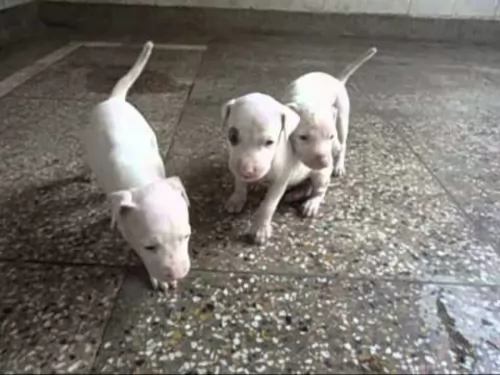 The Gull Terr has a deep chest and this means he is more prone to bloat, a condition known as gastric dilation volvulus.
The Gull Terr has a deep chest and this means he is more prone to bloat, a condition known as gastric dilation volvulus.
Your pet's stomach fills with air and this leads to decreased blood flow to vital organs. The stomach can twist and this is when the condition becomes life threatening as blood supply to the stomach is cut off. Instead of feeding him large meals, feed him smaller meals more frequently.
Deafness in your pet can be temporary or permanent, in one ear or both. There are are so many reasons why your pet could be deaf and it could be a birth defect, an infection or old age. Certain dogs such as the white coated Gull Terr are also more predisposed to congenital deafness.
Get him to the vet who will examine your dog’s ear canal for wax and debris and discuss the way to go for your beloved pet.
 Usually an indigenous rare breed does not have a lot of genetic or hereditary health concerns. This is a little different with the Welsh Sheepdog can suffer from any of these conditions.
Usually an indigenous rare breed does not have a lot of genetic or hereditary health concerns. This is a little different with the Welsh Sheepdog can suffer from any of these conditions.
• Epilepsy – Most respond well to medication and others might not even need medication.
• Collie Eye Anomaly – This is common in collie breeds like the rough coated collie. The development of the Choroid is impaired resulting in harm to the circulation of blood to the eye.
• Atopic Dermatitis – Allergic skin disorder irritating paws, ears, and perineum.
• PRA Progressive Retinal Atrophy - deterioration of the retina can lead to blindness. Inherited.
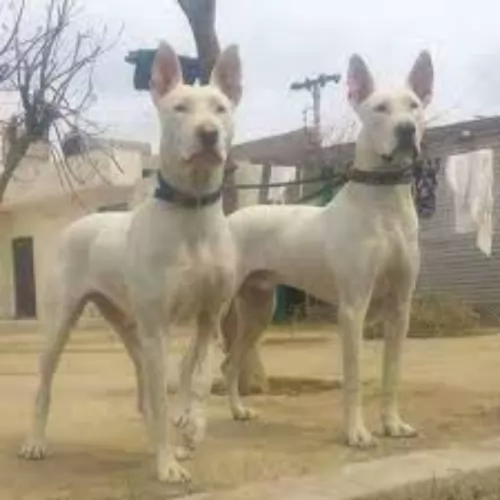 Easy to look after with his short coat, the Gull Terr will only require a brushing twice a week to keep the coat shiny and healthy.
Easy to look after with his short coat, the Gull Terr will only require a brushing twice a week to keep the coat shiny and healthy.
Because his coat is white, it can show dirt easily, and it will simply require taking a damp cloth and wiping the mark off him. You don't want to be bathing him often as this dries his skin out – rather just wipe the coat down.
Your Gull Terr is a highly energetic dog and he loves nothing more than to be involved in robust exercise and games. He is best suited in a home with large grounds and if you do opt to have him in the city, you will have to pay close attention to his exercise needs – lots of walks, runs, ball games, swimming and running with you as you cycle.
You want to be sure that your energetic Gull Terr has a healthy diet full of important proteins, fats, and carbohydrates.
Protein is always important for a dog like this and you want to make absolutely sure that apart from his high quality kibble, you mix in raw meat from time to time as well as cooked chicken, fish, brown rice and vegetables.
When looking for a commercially manufactured dog food, look for high-quality animal protein as a top ingredient. Make sure he always has fresh, cool water available to him.
 1Feeding the puppy active dog feed high quality high protein food. 3-4 x day 1-2 cups
1Feeding the puppy active dog feed high quality high protein food. 3-4 x day 1-2 cups
2.Feeding the adult Active dog feed high quality high protein 2x day 2 cups a day.
4. Games and Exercises This is an extremely active breed that needs a job. They are not the best pets they are working dogs. They need a lot of exercise. They are not good at living indoors. At least 2 hours of exercise daily is a must.